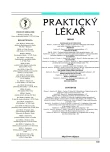-
Medical journals
- Career
Bacterial immunomodulators
Authors: Š. Lukešová; O. Kopecký
Authors‘ workplace: Ústav klinické imunologie a alergologie FN, Hradec Králové přednosta MUDr. O. Kopecký, CSc.
Published in: Prakt. Lék. 2005; 85(8): 437-440
Category: Reviews
Overview
The use of immunostimulating drugs is one way to intervene in the immune system. Many of these agents are of bacterial origin and most are able to stimulate the nonspecific immune response by acting on polymorphonuclear cells and macrophages as well as on specific antibody production. They have been shown to stimulate many of the functions of polymorphonuclear cells, specifically the formation of oxygenated free radicals, chemotaxis and adhesion. These cells participate in both the nonspecific immune response (phagocytosis, proinflammatory cytokine production) and the specific immune response (antigen processing and presentation, lymphocyte proliferation). Bacterial immunomodulator have been shown to increase the production of many cytokines (IL-1, IL-6, IL-8, tumour necrosis factor-alpha and colony-stimulating factor), leading to the activation of the cytokine network. They are also able to stimulate natural killer cells involved in antiviral immunity. Bacterial immunomodulator affect the immune system in a very complex way.
Numerous clinical trials in the world have confirmed the positive role of bacterial immunomodulator in significantly reducing the number of infections in children and adults. The administration of bacterial immunomodulators should be considered with care to avoid the potential risk of inducing an autoimmune disease.Key words:
bacterial immunomodulators – respiratory infections – bacterial antigens – cytokines.
Labels
General practitioner for children and adolescents General practitioner for adults
Article was published inGeneral Practitioner

2005 Issue 8-
All articles in this issue
- Microdialysis of adipose tissue and its application in clinical research and practice
- Bacterial immunomodulators
- Diagnosis and therapy of tracheal stenosis
- Follow-up of employees exposed to potentional profession-linked allergens and the inclusion of workers with allergies in the workplace
- Type A aortic dissection, case reports
- Contribution of fine needle aspiration biopsy under control with ultrasound for a more precise determination of the etiology of ascites
- Antibiotics and their application in pregnancy
- Occurrence of drug interactions in clients of the Škoda Employee Insurance Co.
- Vaccination and consultation in an outpatient clinic of allergy and clinical immunology
- General Practitioner
- Journal archive
- Current issue
- Online only
- About the journal
Most read in this issue- Bacterial immunomodulators
- Antibiotics and their application in pregnancy
- Diagnosis and therapy of tracheal stenosis
- Contribution of fine needle aspiration biopsy under control with ultrasound for a more precise determination of the etiology of ascites
Login#ADS_BOTTOM_SCRIPTS#Forgotten passwordEnter the email address that you registered with. We will send you instructions on how to set a new password.
- Career

